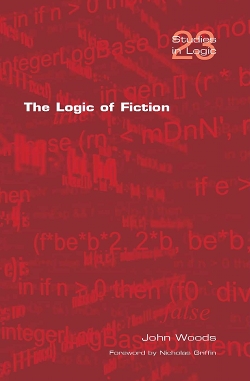 | The Logic of Fiction
John Woods. Foreword by Nicholas Griffin
John Woods’ The Logic of Fiction, now thirty-five years old, is a
ground-breaking event in the establishment of the semantics of
fiction as a stand-alone research programme in the philosophies
of language and logic. There is now a large literature about
these matters, but Woods’ book retains a striking freshness,
and still serves as a convincing template of the treatment
options for the field’s key problems. The book now appears in a
second edition with a new Foreword by Nicholas Griffin and an
extended bibliography covering the period 1969-2009.
As Griffin notes in his Foreword, it is “surprising … on looking
back to discover how little was written on the semantics of
fiction before John Woods’ The Logic of Fiction was published
in 1974. The surprise is the greater because Woods’ book
appeared after almost a quarter century of fierce philosophical
debate about reference … Fictional discourse, one would have
thought, would be an important testing ground for philosophical
theories of referential expressions and one, moreover, in which
the standard theories would likely be tested to destruction. …”
“… One of the great merits of Woods’ book is that it takes
seriously the wide-ranging demands that fiction imposes on
logic and semantics, and does not try to force fiction into
some pre-conceived logical mould …. but thanks to Woods’
pioneering efforts, we are much closer to one now than we
were when he set out to write his book. His book was not the
last word on the logic of fiction; it was much more important:
it was nearly the first.”
NICHOLAS GRIFFIN is Canada Research Chair in Philosophy
at McMaster University. Recent publications include Russell
vs Meinong: The Legacy of “On Denoting”, edited with Dale
Jacquette. JOHN WOODS is Director of the Abductive
Systems Group at the University of British Columbia and
Charles S. Peirce Visiting Professor of Logic in the Group on
Logic and Computational Science, King’s College London. He
has two forthcoming books on fiction – an edited volume,
Fictions and Models: New Essays, and a research
monograph, Sherlock’s Member: New Perspectives on the
Semantics of Fiction, both to appear in 2010.
December 2009
978-1-904987-99-4
Buy from Amazon: UK US
|

